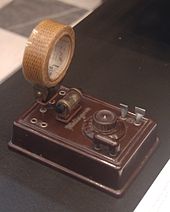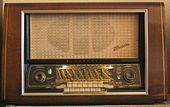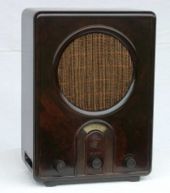Radio
![]()
This article deals with radio as a broadcast receiver. The corresponding mass medium is dealt with in the article Radio. For other meanings of the same name, see Radio (disambiguation).
Radio (Latin radius 'ray') as a short word for radio or broadcast receiver refers to an apparatus for receiving radio broadcasts. In conventional radios, these are transmitted by a broadcasting transmitter by means of terrestrial transmission (such as antenna television) via electromagnetic waves or as high-frequency electrical signals via broadband cable (such as cable television). The received information is essentially converted into sound; to a small extent, the broadcast signal may additionally contain data and information, such as the RDS data which, for example, enables the station name to be transmitted.
In addition to a radio receiver, radio can be received with special extensions, additional devices, USB sticks, computer programs or suitable model series, for example from:
- computers (streaming audio, Internet radio),
- audiovisual players (tape recorders, CD and DVD players) and television sets
- Mobile phones,
- Watches and
- Toys
and with
- analogue and digital satellite or cable television reception equipment, and
- digital receivers of various reception technologies such as SDR or Digital Radio Mondiale (DRM), DAB, HD Radio and other DVB processes
be received.

Detector receiver, manufacturer Hermann Pawlik - Elektrotechnische Fabrik Heliogen, around 1930

Tube radio Florida (1954), Blaupunkt

Tube radio "Volksempfänger", type VE 301, from 1933, different manufacturers
Language
Historically, the terms "radio", "Rundfunk" and "broadcasting" competed at the beginning of broadcasting in Germany. In 1924, "broadcasting" was written in brackets after "Rundfunk" in letters from Austrian authorities. The Reichspostverwaltung in Berlin rejected the buzzword "radio". Radio, they said, was nothing more than a beam. At that time, the Reichspost acted as a guardian of language. For example, it banned the words "poste restante" and "recommanded letter" from its correspondence. So their vote against the word radio carried weight.
In common German it means the radio, derived from the radio set. In Central and Northern Germany it is always a neuter. In Southern Germany, Austrian German and Swiss High German, the radio is also common, derived from the radio apparatus.
Furthermore, both in German-speaking countries and in global usage, the word "radio" denotes a radio or radio station or a chain of stations such as Radio Bremen, Swiss Radio and Television or Radio Canada International. The short form "radio" is always neuter in this meaning, unless a compound noun is formed that requires otherwise (such as "the radio station").
Classification as a radio receiver
In Germany, a radio is a radio receiver within the meaning of the German Interstate Broadcasting Treaty, i.e. a 'technical device which is suitable for the wireless or wire-bound, non-time-delayed listening or viewing or recording of radio broadcasts (radio and television)'.
Questions and Answers
Q: What is radio?
A: Radio is a way to send electromagnetic signals over a long distance, to deliver information from one place to another.
Q: What is a transmitter?
A: A transmitter is a machine that sends radio signals.
Q: What is a receiver?
A: A receiver, also known as an antenna, is a machine that "picks up" radio signals.
Q: What is a transceiver?
A: A transceiver is a machine that performs both the functions of a transmitter and a receiver.
Q: What is a broadcast?
A: When radio signals are sent out to many receivers at the same time, it is called a broadcast.
Q: How is sound sent through radio?
A: Sound can be sent through radio, sometimes through Frequency Modulation (FM) or Amplitude Modulation (AM).
Q: What are some examples of things that can be controlled using radio signals?
A: Airplanes and cars are examples of things that can be controlled using radio signals.
Search within the encyclopedia